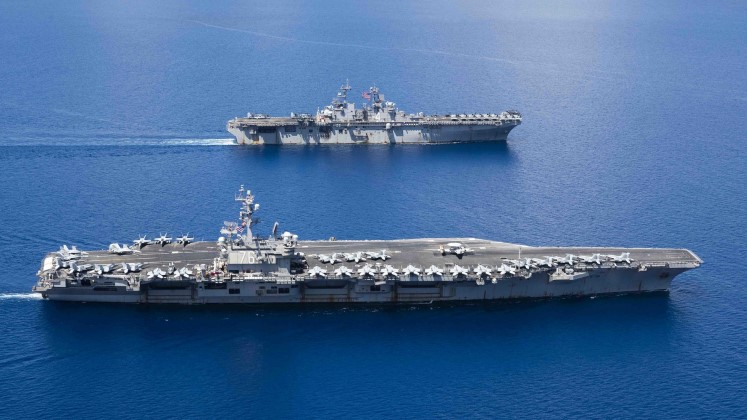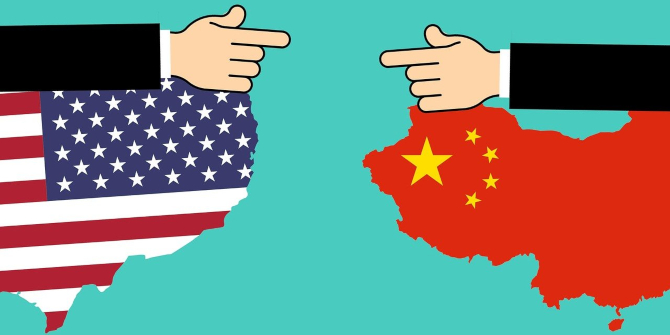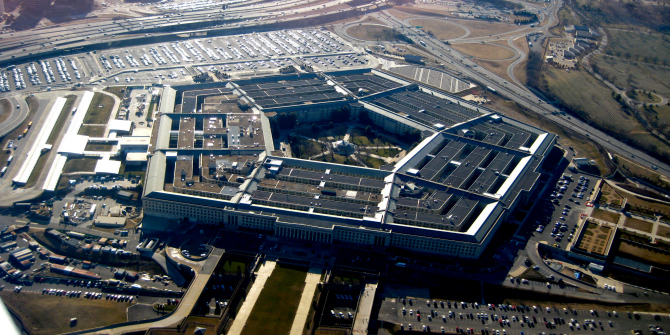 Is the United States doomed to go the way of the great powers of the past and lose its global position of authority, or will it be able to avoid this fate? In 1987, Paul Kennedy’s book, The Rise and Fall of the Great Powers made the case that the US was not immune from the forces that could lead to its decline. Michael Cox looks at the legacy of Kennedy’s book, writing that in the more than 35 years since its publication, The Rise and Fall of the Great Powers has remained relevant as the tectonic plates of global power have shifted in ways that have made it harder for the United States to shape the world as it once did.
Is the United States doomed to go the way of the great powers of the past and lose its global position of authority, or will it be able to avoid this fate? In 1987, Paul Kennedy’s book, The Rise and Fall of the Great Powers made the case that the US was not immune from the forces that could lead to its decline. Michael Cox looks at the legacy of Kennedy’s book, writing that in the more than 35 years since its publication, The Rise and Fall of the Great Powers has remained relevant as the tectonic plates of global power have shifted in ways that have made it harder for the United States to shape the world as it once did.
One of the more enduring debates about the United States over the past half century is whether one of the most successful superpowers in history will not one day go the way of all other great powers and slip off the proverbial perch on which it has been balancing since the end of the Second World War. The discussion first began in the early 1970s with the collapse of the Bretton Woods system in 1971. This was then followed in short order by the OPEC oil embargo of 1972, the apparent death of the imperial presidency with Nixon’s resignation in 1974, and last but by no means least, ignominious defeat in Vietnam one year later. A debate that began in unusually turbulent times, then continued with adversaries on one side confidently proclaiming the end of ‘Pax Americana’, and such stalwarts of international relations as Susan Strange declaring the idea a ‘myth’ and Bruce Russett arguing in an article whose intriguing title belied its serious nature, that if one bothered to distinguish between power base and control over outcomes – which few so-called ‘declinists’ did – then the American position had not declined very much at all.
The Rise and Fall of the Great Powers
It was at this point that an historian threw a literary hand grenade into the discussion. He probably did not intend to; indeed as he later confessed, he was rather taken aback by the furore which his 1987 book on The Rise and Fall of the Great Powers caused at the time. In fact, it was rather odd to say the least that a large volume dealing with the fate of most European empires since the 16th and 17th centuries, and only mentioning the United States and the Soviet Union towards the end, would have the impact it did. Yet it did, transforming the British-born, Yale-based Paul Kennedy from a very well-respected historian of Anglo-German relations into something of a superstar of which the public – especially in the United States – simply could not enough. From all accounts, his phone never stopped ringing. He was asked onto talk shows. He got bucket loads of mail. And the book was reviewed and debated nearly everywhere. Meanwhile, sales started to go through the roof. Clearly, this was not just any old book. It was a publishing sensation. Even a copy was found among Osama bin Laden’s books in in his compound in Abbottabad in 2011!

“120405-N-LE393-014” (CC BY 2.0) by U.S. Naval War College
But how does one account for this success? The book was a brilliant work of synthesis, something that even his critics recognized. Even so, the main thesis – that great powers that had once considered themselves to be ‘great’ did not remain great for ever – could hardly be considered entirely original. As Kennedy later admitted, he ‘felt no great ownership of the central idea that all empires lose their coherence over time’. Nor was the idea of “imperial overstretch” completely novel either. It is implicit in Thucydides’ explanation of why Athenian power finally fell. Others too had written about the dangers of countries seeking security through expansion. Yet it was Kennedy’s name that started to appear in lights.
So why then did The Rise and Fall do so remarkably well, aside from the not unimportant fact that its author was already a very well-known international historian with a stellar reputation, with an intimate knowledge of many archives and an equally great command of the English language? One obvious reason was that he entered a debate that had already been going on for some time. However, rather than taking sides, he laid out his argument with scholarly precision. The fact that he drew deeply from history also lent credibility to his overall thesis that even if modern great powers like the US and the Soviet Union had their own unique features, they were not immune from being undermined either by their own success or being outcompeted by other rising powers.
One also suspects that Kennedy touched an especially raw nerve when it came to the United States by suggesting (albeit with great care and with all sorts of qualification) that however powerful the US was (and would remain for some time) this did not necessarily guarantee it a dominant position in the international system forever. Raised on the idea that the United States was an exceptional country with an enormous capacity for inventing and reinventing itself, his argument that the United States might not be able to escape one of the most basic laws of world history went down rather badly in a nation that had become accustomed to being number one. As one of his many admirers later pointed out, Kennedy’s case was ‘provocative because it offended the very notion of American singularity’. Nothing was forever argued Kennedy, ‘not even Pax Americana’. This was something that many Americans did not like hearing.
The price of American power
The book’s very great success also owed more than just a little to growing concerns about the state of the US economy in the 1980s. Republicans today may like to claim that Reagan saved a stagnating American economy from Keynesianism. However, it came at a cost with the national debt increasing from $997 billion to $2.85 trillion as the US tried to manage a burgeoning deficit running at about four percent of GDP.
Though a large part of this was the result of Reagan’s unfunded tax cuts, much of it was also the consequence of his upping the stakes militarily and increasing defence spending by at least 30 percent. Achieving ‘peace through strength’ might have been a noble cause that may have made Americans feel safer. Nonetheless, it came at a very high price, one which many economists (and not just Kennedy) thought the US could ill afford over the longer term.
It also looked as if all this muscular activity was bearing little fruit internationally. Reagan undoubtedly had a very special relationship with Margaret Thatcher; but relations with the main European powers remained tense and fraught. Nor by the end of his first term in 1984 did the US appear to be winning the Cold War. In fact, if anybody was seen to be shaping the future, it was not Reagan but the Soviet Union’s dynamic, “new thinking” President, Mikhail Gorbachev. Meanwhile, the US looked to be getting bogged down in regional conflicts from Afghanistan to Central America. The so-called Reagan Doctrine of roll back was not without its own logic. But to some critics it looked as if it was drawing the US into a series of unnecessary wars where the outcomes still seemed uncertain, and the costs (moral as much as strategic) looked to be increasingly high.
All this when taken together certainly lent some credibility to the Kennedy argument that the US was expending far too much blood and treasure in trying to maintain its international position. Of course, not everybody agreed; and not everybody who went on to criticize Kennedy for being a ‘declinist’ was on the conservative right or a friend of the Republican President. Yet his analysis did present GOP critics with an intellectual weapon with which to attack the White House. Here after all was a Yale professor of great distinction making a better case than they ever could, and doing so it would seem without even being conscious that he was doing anything other than applying a general historical argument to the modern world. But it must have been music to the ears of those hostile to Reagan, especially coming into the 1988 presidential election. This in turn provoked a response by Republicans who it seems responded in kind by declaring ‘open season on Kennedy’. Famously (or infamously) Kennedy even ended up having to defend himself against Jeane Kirkpatrick (Reagan’s former foreign policy adviser) in front of the Senate foreign relations committee.
A well-timed book in a shifting world
Furthermore, all this was happening when the balance of economic power in the world looked to be shifting away from the old, tired West – Europe in particular – and towards the new dynamic economies of Asia. Whether or not the West was in such bad shape, or Asia in such rude health didn’t really matter very much. The world it seemed was not standing still. This was in part a result of the success now being enjoyed by countries like South Korea, and in part a result of the impact the economic reforms were already having in China. But the most dramatic shift that was now taking place was in Japan. Later of course it became fashionable to talk of Japan as a ‘bubble economy’ that was bound to crash and burn. However, that is not how it appeared at the time. Indeed, quite a few analysts (even serious ones) came to the radical conclusion that it was only a matter of time before Japan would overtake the United States. Moreover, if Japan was doing so well, was this not because it was not burdened down by all the global responsibilities that the United States had taken upon itself over the years. Clearly it was time for a rethink.
Finally, success in life – as in publishing – very much depends on timing, and Kennedy was most fortunate that he published his book in 1987 and not two or three, or even five years later when the world was turning on its axis. Many in the US had never been entirely comfortable with this ‘British scholar translated to New Haven’ drawing all sorts of misleading historical analogies between past empires and the United States. However, as the world began to change once again one could almost hear the sighs of relief going round Washington. First came the collapse of Soviet power in Europe in 1989. A year or more later the US then mobilized a not inconsiderable military coalition and drove Saddam Hussein’s Iraqi forces out of Kuwait. Then the Japanese economic bubble burst. And finally, in late 1991, the other superpower walked off the stage of history. When this in turn was followed by eight years of robust economic growth in the United States in an international system where there now only appeared to be one serious ‘great power’ worthy of the name, it very much looked as if the main thesis of The Rise and Fall of the Great Powers (at least when applied to the United States) had turned out to be seriously misleading. One of Kennedy’s growing army of critics could not have put it more plainly in an article he published in 2001: Paul Kennedy, he opined, had just got it wrong.
Yet Kennedy remained remarkably sanguine; and perhaps he had something to be sanguine about. After all, he had never said the US was about to implode like the empires after World War 1 and World War 2. Rather, like all great powers in the past, it faced challenges that would not go away just because it had enjoyed victory in the Cold War. Moreover, even if the US remained intact, one of the other great powers about which he had written at equal length had not. One well known international historian (a Norwegian, not an American) even insisted that ‘events in the Soviet Union’ fitted Kennedy’s theory of imperial overstretch ‘almost perfectly’. And to cap it all, no sooner had a whole host of pundits started to talk about another American Century in the making – by the end of the 1990s it was even becoming fashionable to refer to America as a new ‘Rome on the Potomac’ – that cracks and fissures started appearing in the edifice of the unipolar order. The world was continuing to evolve, as Kennedy had always suggested it might.
Even the European Union was beginning to make its mark. Though weak militarily and without much in the way of a coherent world view, since the collapse of Soviet power it had navigated the transition from Community to Union without too much going wrong. Indeed, by the beginning of the 21st century it had in effect become the largest single market in the world. Meanwhile the big emerging economies were doing especially well in the age of globalization, with China and India now predicted to become the first and third largest economies in the world by 2050. Even Russia began to show signs of economic and foreign policy life after the catastrophic 1990s. Meanwhile, many countries which had formed part of the ‘Third World’ during the Cold War – now known collectively as the ‘Global South’ – began to make it clear that they were no longer prepared to buy into the existing rules-based order because those rules in their view had been written by the United States.
Nor was the United States covering itself in glory when it came to foreign policy. There were it is true some successes. But interventions in Iraq, Afghanistan and Libya did little to enhance Washington’s reputation for statecraft. Meantime, the American mantra that globalization would lift all boats started to sound distinctly hollow in the wake of the 2008 crash and the Trump victory eight years later. And to cap it all, the United States itself started to come apart at the seams. Even as early as 2014 (two years before Trump entered the White House) it was already becoming clear that the US was fast becoming deeply polarized and that these divisions were only likely to become deeper still as time went by.

“191006-N-VI515-0064” (CC BY-NC 2.0) by U.S. Pacific Fleet
America declines or America endures?
The consequence of all this was once again to shift the debate about the United States in a new direction. Little was now said about the unipolar moment. Even less about the future of the world being liberal. Instead, a much more downbeat narrative began to appear in much of the western literature which spoke increasingly of the world becoming post-American and the liberal order showing signs of fatigue. Not everybody agreed that this amounted to American decline. The US economy after all remained the biggest and most productive in the world. The US dollar continued to dominate amongst international currencies. And American popular culture still held the dominant position in the world. This is why many serious writers from different theoretical perspectives continued to insist that multipolarity was a ‘myth’ and that American power would endure. Yet according to many writers there was little doubt about the direction in which history was moving.
Nor should we have been so surprised by this. In fact, it had not been Kennedy the historian, but a whole host of international relations scholars of a realist bent who saw this as but the working out of one of the more basic laws of world politics: namely that the international system abhorred an imbalance in power almost as much as pacifists hated war. Indeed, had not Kenneth Waltz argued many years earlier that the US’ “unipolar moment” was likely to be fleeting because other states would eventually balance against the United States and would in the end push back. A more multipolar world with many more actors in it beckoned. Kennedy agreed. The US may have entered the 21st century as the ‘world’s number-one power’ as he argued back in 1999. But within ten years, and certainly twenty, the outlook was looking altogether more problematic. Some Americans may have liked to hold onto the idea that having seen off the USSR, the United States had the capacity to do the same for any other challenger as well. Others meanwhile could point (and did) to America’s key role in maintaining a series of world-wide alliances.
Yet none of this could hide the fact that the tectonic plates of power were shifting and doing so in ways that rendered America’s ability to shape the world more difficult. Kennedy was not a determinist. The past was not an exact guide to the future. Unforeseen events and foreign policy miscalculations could easily change the direction in which the world appeared to be moving. But as Kennedy continued to insist, there was nothing to suggest that those ‘economic shifts’ which had affected the positions of great powers in the past were not still operating. The ‘pattern of the rise and fall of great powers’ had not ‘ended’. History had not yet come to end.
Please read our comments policy before commenting.
Note: This article gives the views of the authors, and not the position of USAPP – American Politics and Policy, nor the London School of Economics.
Shortened URL for this post: https://bit.ly/414NdAx








an objective analysis of stark political realities of an ever dynamic and fluid global order. enjoyed reading it.
Thank you for the wall written article us Americans are very sensitive. We don’t like to look at ourselves, especially the bad parts of our history until we look at our history we will not change so of course the only way will change it is something big happens in the economy, a crash of a magnitude that even the Fed can’t bail out thank you.